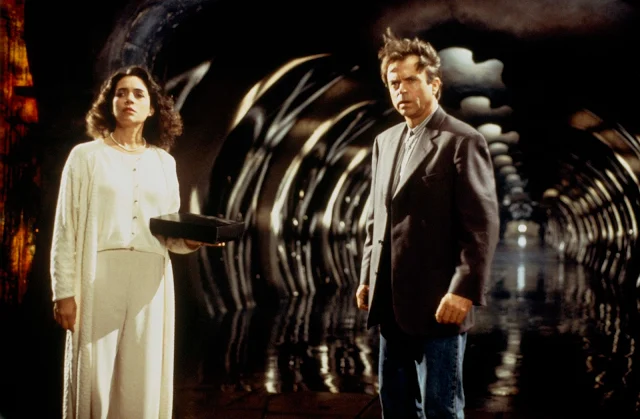 |
| William Hurt and Solveig Dommartin in Until the End of the World |
Cast: Solveig Dommartin, William Hurt, Sam Neill, Rüdiger Vogler, Jeanne Moreau, Max Von Sydow, Chick Ortega, Elena Smirnova, Eddy Mitchell, Adelle Lutz, Ernie Dingo, Ernest Beck, Christine Oesterlein, Kuniko Miyaki, Chishu Ryu, Allen Garfield, Lois Chiles, David Gulpilil, Justine Saunders, Paul Livingston.
Screenplay: Peter Carey, Wim Wenders.
Cinematography: Robby Müller.
Production design: Sally Campbell, Thierry Flamand.
Film editing: Peter Przygodda.
Music: Graeme Revell.
Wim Wenders's almost five-hour-long cut of
Until the End of the World may be the most self-indulgent film I've ever seen, and I've seen
Heaven's Gate (Michael Cimino, 1980). The original cut of Wenders's movie was 20 hours long, but it was reduced to just under three hours for its first European release and to a bit over two and a half hours for American audiences in 1991. It failed with the critics and the box office. Wenders finally re-edited it to the 287-minute version released in 2015 and now being shown on the Criterion Channel. But it really seems to me to be two movies stitched together by Sam Neill's voiceover narration. The first half is what Wenders himself has called the "ultimate road movie," a characteristic genre for the director of
Alice in the Cities (1974),
Kings of the Road (1976), and
Paris, Texas (1984), starting in Venice and then bouncing to Paris, Berlin, Lisbon, Moscow, Tokyo, San Francisco, and finally Australia, where it settles for the second half. This half is a sci-fi film about experiments with perception and dreams that take place in the shadow of a potential nuclear holocaust. The first half is often funny; the second half isn't. I'm not prepared to call
Until the End of the World a masterpiece, unless it's a masterpiece for cineastes, who can indulge themselves to the fullest in tracing the allusions and influences that shape the movie. The characters played by William Hurt and Solveig Dommartin, for example, spend time in an idyllic setting in Japan where they're tended by characters played by Chishu Ryu and Kuniko Miyaki, actors familiar from the films of Yasujiro Ozu. Hurt's character's parents are played by the iconic Jeanne Moreau and Max Von Sydow. Wenders even evokes his own past by casting Rüdiger Vogler, the star of
Alice in the Cities and
Kings of the Road. It's a witty film in many regards, but as I said, self-indulgent. And 287 minutes is a kind of forced binge-watch, which makes me think that
Until the End of the World would have made a terrific miniseries for Netflix or Hulu if they'd been around in 1991.






.jpg)
.jpeg)
.jpeg)

















